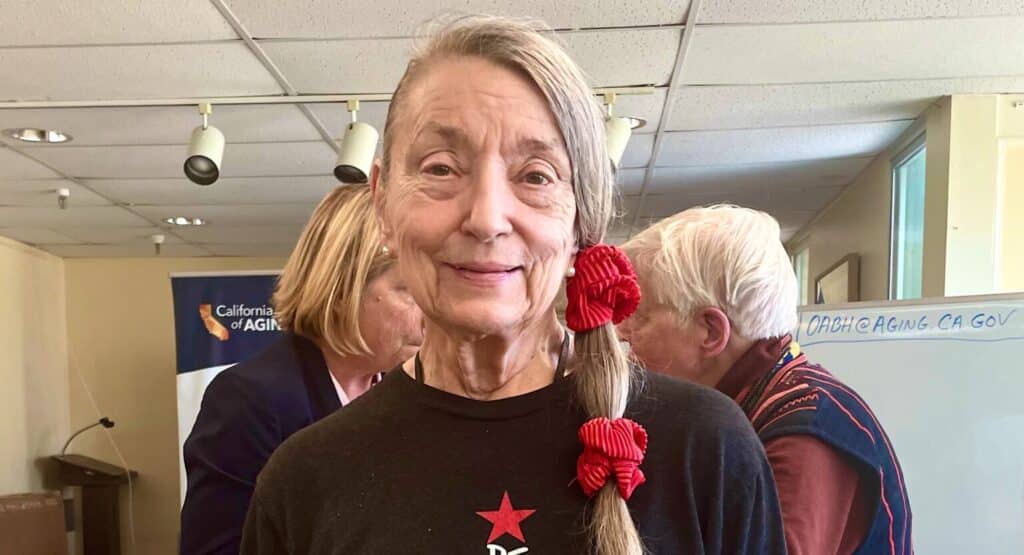By Selen Ozturk. Ethnic Media Services.
With a quarter of Californians age 65 or older by 2030, the state is looking for ways to better meet the mental health needs of older adults.

Fancher Larson, a San Francisco resident, has spent much of his career advocating for the rights of people with mental health issues. An older adult, she was recently diagnosed with Alzheimer's and now worries about what will happen to her adult son if she is unable to care for him.
Larson's story is among the array of mental and behavioral health challenges facing older adults in California and across the country in the wake of the COVID-19 pandemic.
"I'm not as worried about myself as I am about what's going to happen to my son," said Larson, a patient advocate with San Francisco Mental Health Clients' Rights Advocates, a nonprofit organization, whose 40-year-old son is struggling. mental health
“If he ends up in the system when I can no longer take care of him, I fear he will kill himself. I don't want to send him to a county center or sedate him with medication," said Larson, who spoke at a panel discussion April 27 about the behavioral health needs of Bay Area seniors hosted by the Department of California Aging ?CDA, for its acronym in English?.
The event, held at the On Lok 30th Street Senior Center in San Francisco, drew patients, physicians, CDA staff, social workers and other community leaders who shared their experiences as more seniors face challenges physical, mental, and financial, even as pandemic restrictions ease.
The meeting is part of statewide efforts to improve services for older adults under California's Master Plan for Aging, a 10-year plan aimed at improving support at the state and local levels in five key areas: housing, health care , social equity, caregivers and financial security.
Fifteen percent of California residents are 65 or older. That number is expected to rise to 25 percent by 2030.
CDA Director Susan DeMarois said the goal of the roundtable, the first of four, with three more in Fresno, San Bernardino and Ukiah, is to gather input from the community that can shape policy to meet the needs behavioral health services for older adults, who have seen an increase in physical and mental health problems since the start of the pandemic.
Experts attribute the trend in part to increased social isolation as a result of pandemic-related restrictions and say addressing that isolation by making mental health resources more available is key.
"Mental health remains taboo in many communities of color," said Michelle Fonseca, a resident of the city's Mission neighborhood who is working to become a Licensed Clinical Social Worker.
“With all the misinformation about COVID, many older adults did not want to get vaccinated,” Fonseca continued. "In my neighborhood, it was community members knocking on doors, speaking Spanish, Chinese, Tagalog, that gave these people that sense of security to go get vaccinated."
“People are much more likely to get over their fears if someone like them is sitting across the room or on the other line,” said Dr. Marcy Adelman, co-founder of the Openhouse SF LGBTQ+ senior resource center and member of California Commission on Aging.
Adelman, along with On Lok's medical director, Dr. Ben Lui, stressed that mental and behavioral health support needs to be better integrated into primary care services.
"Effective behavioral health services are those that are integrated into primary care," Lui explained. "For older people with behavioral health problems, there is often associated instability, and a good public health prevention model should address these issues from the bottom up, such as housing, financial planning, and transportation needs."
Jim DeRoche, a senior living in San Francisco, said training trauma-informed care workers was key to connecting with older adults like him. She also described her experience with the telephone Friendship Line, operated by the Institute on Aging.
Seniors who used the Friendship Line "reported a marked decrease in depression, anxiety and loneliness over six months," said Mia Grigg, vice president of Integrated Care Services at the Institute on Aging. "This trust-based emotional care is part of primary care."
Roundtable participants agreed that coordination of efforts to integrate behavioral health into primary care services should begin at the state level.
"For many older adults with mental illness who go on to develop dementia, that new diagnosis means they are no longer eligible for mental health services they previously used," said Jennifer Stephens-Pierre, director of the County Area Agency on Aging. Mall. "Without legislation to change this, they fall into a space where they want to undercount one disease over the other in order to continue getting the care they need."
Mark Salazar, executive director of the San Francisco Mental Health Association, stressed that his agency has seen "significant drops in 30-day and six-month readmission rates" after integrating peer staff with health services. County of Marin through the San Francisco Department of Public Health and San Francisco General Hospital.
Other participants shared their own experiences coordinating between mental and behavioral health programs, imploring CDA leaders to reflect this at the state level.
“We have been able to serve seniors more effectively through Openhouse SF when we coordinate all of the programs: mental and behavioral health outreach with help for seniors experiencing homelessness or LGBTQ+ support services,” Adelman said.
But that coordination at the city level is not enough, he added.
“Do I ask state leaders to invest in organizations that create the physical and legal infrastructure? to help older people in their own communities.” To read the original note in English, from click here.
You may be interested in: Will reproductive rights determine the course of the elections in 2024?


